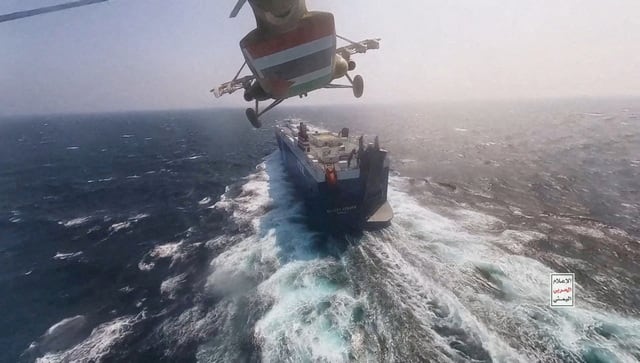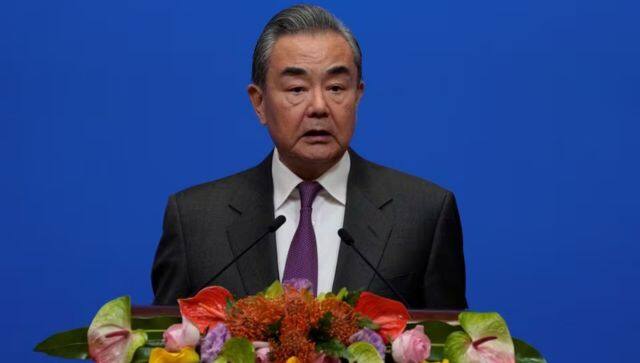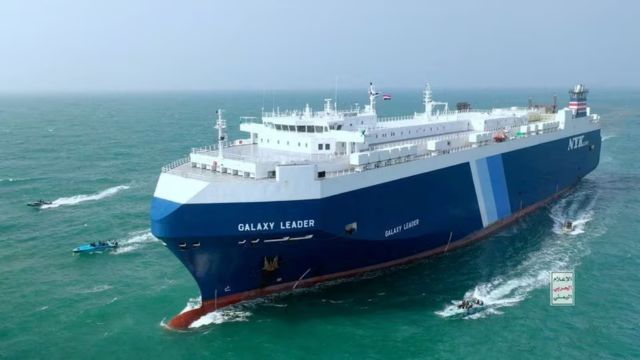Amid the Houthi attacks in the Red Sea, some vessels are taking an unusual step to protect themselves – advertising their links to China. The Houthis say their attacks on shipping routes in the Red Sea are a show of support for the Palestinians and Hamas, the Islamist group that controls Gaza, in its war against Israel. The Houthi attacks have disrupted international commerce, forcing international shipping to take the long route around South Africa to avoid being struck. The increase in delivery costs is stoking fears it could trigger a fresh bout of global inflation. But how are the ships doing so? And why is this relevant? Let’s take a closer look: What happened? According to Bloomberg, at least five ships that went through the Red Sea last week changed their destination signal to messages like “all Chinese crew” or something similar. As per Business Insider, these destinations are put into the automatic identification system (IAS) – a global tracker mandated by the international maritime convention. These are entered by the crew manually and can be viewed by nearly anyone on the internet.
Business Insider also found four more ships in the Red Sea displaying similar messages.
The bulk carrier Great Ocean, which visits Chinese ports regularly and flies the Liberian flag, wrote that it had an “ALL CHINESE CREW.” Dias, another bulk carrier that also flies the Liberian flag and primarily travelled to ports in Ukraine and China last year, wrote “CHINA” when it was near the Red Sea. Of the nine ships identified by the outlets, just one had a Chinese name. Business Insider reported that at least two ships in the area also declared an affiliation with Russia. Ships that left the region then changed their AIS destinations back to normal, as per the report. Why is this relevant? This indicates that the crew, or perhaps the company that own the vessels, believe showing a link to China could help avoid an attack, as per Bloomberg. China has criticised Israel’s bombing of Gaza and pushed for a two-state solution. According to Business Insider, this also comes as China attempts to project itself for being well-regarded around the world and keeping good relations with lower-income nations. China’s position on the conflict “has been strong enough for individual ships to try to use it,” China analyst Sari Arho Havrén of the Royal United Service Institute told Semafor. [caption id=“attachment_13598892” align=“alignnone” width=“640”] Houthi military helicopter flies over the Galaxy Leader cargo ship in the Red Sea in this photo released 20 November. Reuters[/caption] Mohammed Ali al-Houthi, head of the Houthi supreme revolutionary committee, on social media urged ships to use AIS system to say “we have no relationship with Israel”. He told BBC News: “This is a simple and low-cost solution that will incur no financial expenditures for any business… Any country that gets involved with the US-led coalition to protect Israeli ships will lose its maritime security and will be targeted.”
Houthi military helicopter flies over the Galaxy Leader cargo ship in the Red Sea in this photo released 20 November. Reuters[/caption] Mohammed Ali al-Houthi, head of the Houthi supreme revolutionary committee, on social media urged ships to use AIS system to say “we have no relationship with Israel”. He told BBC News: “This is a simple and low-cost solution that will incur no financial expenditures for any business… Any country that gets involved with the US-led coalition to protect Israeli ships will lose its maritime security and will be targeted.”
But not everyone is convinced by this strategy.
Dr Salvatore Mercogliano, a senior academic at the US Naval Institute, told iNews, “The use of China in ship identification has become more prolific. Ships are saying if they are Chinese-owned or Chinese crew on board. There is a concept that this connection could spare the ships, but we have seen Chinese ships targeted in the past.” Dr Tobias Borck, a West Asia expert at the London-based RUSI think-tank, added, “How they come to determinations of whether ships are tied to Israel is anyone’s guess. In some instances, the connection between ships that were attacked and Israel was highly tangential at best, non-existent at worst. “So ultimately, anyone sending ships through the strait and the Red Sea currently has to determine whether they are confident enough that the Houthis won’t find some connection, real or imagined – or simply make a mistake. That goes for China and Russia just as much as for Brazil or Japan.” “There is definitely the potential for China and/or Russia using their connection with Tehran to pressure the Houthis,” Mercogliano added. China’s foreign minister Wang Yi on Monday called for a larger, more authoritative Israeli-Palestinian peace conference and a timetable to implement a two-state solution as the Gaza conflict escalated. “China calls for the convening of a larger-scale, more authoritative and more effective international peace conference, the formulation of a specific timetable and road map for the implementation of the ’two-state solution’, and support for the prompt resumption of Israel-Palestinian peace talks,” Wang said.
A Chinese foreign ministry spokesperson said on Monday that the road map needed to be “binding”.
“As for the timing and venue of the conference and where it will be hosted, I think it needs to be determined by all parties through consultation,” Mao Ning said at a regular news conference in Beijing. “China also welcomes the active role of the United Nations in this regard,” she said. [caption id=“attachment_13581212” align=“alignnone” width=“640”] Chinese Foreign Minister Wang Yi. Photo- Reuters[/caption] The Red Sea attacks have forced commercial ships to take a longer, costlier route around Africa, stoking concern about inflation and supply chain disruptions. The attacks have also placed Beijing’s commercial interests along the Suez Canal at risk. The Iran-backed Houthi militia from Yemen that seeks “Death to Israel” is challenging the ability of the world’s biggest trading nation to defend billions in strategic investments in Egypt. Since President Abdel-Fattah el-Sisi came to power in 2014, China has stepped up its investment and commercial activities along Egypt’s Suez Canal, through which a significant amount of the Asian giant’s West-bound goods flow. But more than money is at stake. Beijing is under pressure to prove that its involvement in an unexpected detente between regional rivals Saudi Arabia and Iran in 2023 went further than dotting the “i"s and crossing the “t"s. Following that agreement, China’s top diplomat, Wang Yi, currently in Egypt as part of a tour of four African countries, said Beijing wants to play a constructive role in handling global “hotspot issues.” US officials believe China to be instrumental in reining in Iran, and have reportedly pressed Beijing to use its influence over Tehran to help prevent the conflict between Hamas - which is also backed by Iran - and Israel from spreading. So far, China appears restrained in its diplomacy because of its position of non-interference in other sovereign states’ internal affairs. Yet at the same time it aspires to raise what Wang has referred to as China’s “international influence, appeal and power” to shape events through diplomacy. Last week, the United States and Britain launched strikes against Houthi targets in Yemen after the group attacked ships in the Red Sea The US has said Australia, Bahrain, Canada and the Netherlands supported the operation against the Houthis, and sought to present the air strikes as part of an international effort to restore the free flow of trade in a key route between Europe and Asia that accounts for about 15 per cent of the world’s shipping traffic. With inputs from agencies
Chinese Foreign Minister Wang Yi. Photo- Reuters[/caption] The Red Sea attacks have forced commercial ships to take a longer, costlier route around Africa, stoking concern about inflation and supply chain disruptions. The attacks have also placed Beijing’s commercial interests along the Suez Canal at risk. The Iran-backed Houthi militia from Yemen that seeks “Death to Israel” is challenging the ability of the world’s biggest trading nation to defend billions in strategic investments in Egypt. Since President Abdel-Fattah el-Sisi came to power in 2014, China has stepped up its investment and commercial activities along Egypt’s Suez Canal, through which a significant amount of the Asian giant’s West-bound goods flow. But more than money is at stake. Beijing is under pressure to prove that its involvement in an unexpected detente between regional rivals Saudi Arabia and Iran in 2023 went further than dotting the “i"s and crossing the “t"s. Following that agreement, China’s top diplomat, Wang Yi, currently in Egypt as part of a tour of four African countries, said Beijing wants to play a constructive role in handling global “hotspot issues.” US officials believe China to be instrumental in reining in Iran, and have reportedly pressed Beijing to use its influence over Tehran to help prevent the conflict between Hamas - which is also backed by Iran - and Israel from spreading. So far, China appears restrained in its diplomacy because of its position of non-interference in other sovereign states’ internal affairs. Yet at the same time it aspires to raise what Wang has referred to as China’s “international influence, appeal and power” to shape events through diplomacy. Last week, the United States and Britain launched strikes against Houthi targets in Yemen after the group attacked ships in the Red Sea The US has said Australia, Bahrain, Canada and the Netherlands supported the operation against the Houthis, and sought to present the air strikes as part of an international effort to restore the free flow of trade in a key route between Europe and Asia that accounts for about 15 per cent of the world’s shipping traffic. With inputs from agencies
)